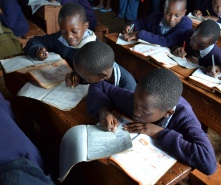The theme of this year's International Literacy Day, Literacy and Peace, which fell on September 8th,adopted the themeof the
United Nations Literacy Decade (UNLD), in order to explicit the value that literacy brings to people across the world.

A good quality basic education equips pupils with literacy skills for life and further learning; literate parents are more likely to send their children to school; literate people are better able to access continuing educational opportunities; and literate societies are better geared to meet pressing development.
The association of this year's literacy daywithpeace is made through thecontributionwhich itbrings to obtaining individual freedoms and better understanding of the world, as well as in preventing or resolving conflict.
As stated on the United Nations Educational, Scientific and Cultural Organization (UNESCO)'s website,"the connection between literacy and peace can be seen by the fact that in unstable democracies or in conflict-affected countries it is hard to establish or sustain a literate environment."
Literacy and educationalso correlates to positive impacts on health, furthering literacy through educationenables children to learn about health,specifically, throughwhat is known as
Skills-based health education. Educational process as a whole also provides skills on critical thinking, making importantchoices, andenabling children to opt for healthy livestyles.
Education is also fundamental to sustainable development, and enables people to be more productive, to earn a better living and enjoy a betterquality of life and contribute to a country's overall economic growth.
Education has now become recognised for its importance reflected in the commitments of the
MDGs andachieving
Education for All.
For over 40 years now, UNESCO has been celebrating
International Literacy Day by reminding the international community that literacy is a human right and the foundation for learning.

